RSTMH President Simon Cathcart recaps on Challenges in Disease Elimination
Cambridge and Swimming
Really delighted to have hosted this incredible meeting in Cambridge – the Society was previously here in 1990 with a residential meeting – and I enjoyed finding (and swimming) at Jesus Green Lido early one morning. The weather was phenomenal, hottest September day ever. Further swimming in the river Cam was required later in the week!
Agenda setting
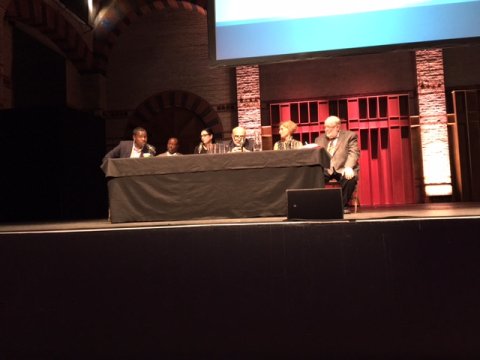
From the outset of the meeting, we had high-quality speakers, with Professor David Heymann’s opening address setting the scene for the week (smallpox and rinderpest eradication), followed by lively discussion and debate on the elimination agenda.
Further topics included NTDs: trachoma, podoconiosis, leprosy and yaws. Our emerging leader awardee, Dr Kebede Deribe, was on the panel discussing mapping of podoconiosis. This is an area we have supported through our grants programme and will continue to collaborate in.
Dr Roy Vagelos gave us a truly memorable and heart-warming talk on the role Merck played (and still plays) in the delivery of ivermectin for the treatment of onchocerciasis.
Mid-week medals and awards
We were delighted that all four of this year’s medal and prize winners were able to attend the conference to receive their awards.
The Chalmers Medal
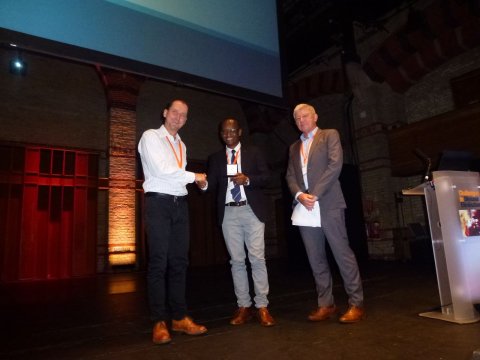
The Chalmers Medal was awarded to Professor Abdisalan Noor of the KEMRI-Wellcome Trust Research Programme in Naorobi, Kenya; his citation was read by Professor Kevin Marsh.
The Donald Mackay Medal

The Mackay Medal was awarded to Professor Moses Bockarie of the Liverpool School of Tropical Medicine; his citation was read by his long-term friend and colleague Professor Alan Fenwick.
The Manson Medal
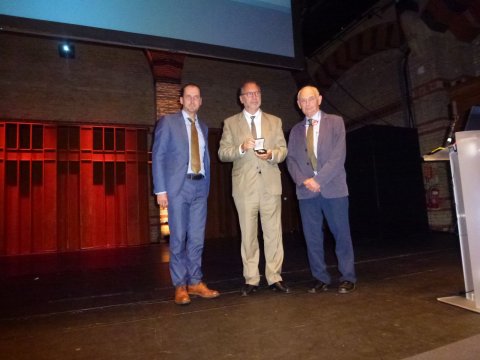
The Manson Medal, RSTMH's highest mark of distinction, was awarded to Professor Peter Piot of the London School of Hygiene & Tropical Medicine; his citation was read by RSTMH past president Professor David Molyneux.
Emerging Leaders Award
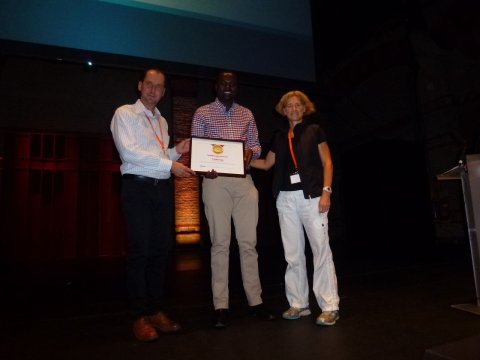
The Emerging Leaders Award was awarded to Dr Kebede Deribe of Addis Ababa University, Ethiopia; his citation was read by Professor Gail Davey.
RSTMH Poster prizes
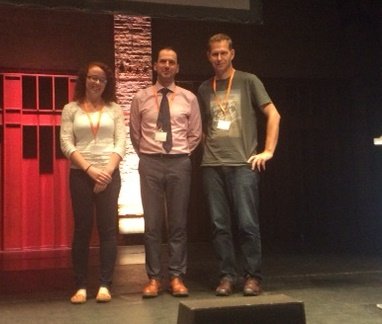
It was a pleasure to announce and personally congratulate our poster prize winners, Dr Michael Coleman, Dr Sian Goss and Dr Ashley Styczynski, on their successful presentations.
- 1st prize: The impact of changing vector control policy for visceral leishmaniasis elimination in India, Dr Michael Coleman, Liverpool School of Tropical Medicine
- 2nd prize: UK investments in malaria research – mapping this global health strength in the drive to elimination, Dr Sian Goss, University of Southampton
- 3rd prize: Emerging zoonotic vaccinia virus in a postsmallpox- vaccination era Colombia, 2015, Dr Ashley Styczynski, Centre for Disease Control
Thank you to all those who submitted abstracts for posters and presentations, and to those who assessed and judged for us: Professor Jimmy Whitworth, Ms Samantha Warne and Dr Clare Hinkley.
Malaria
The latter half of the week focussed on malaria, with (among others) Bruno Moonen updating us on elimination, and Professor Chris Drakeley chairing and leading discussions. Congratulations to Chris on delivering his inaugural lecture at LSHTM the following week.
We were honoured to receive Professor Liao from China to talk about Professor Tu Youyou’s Nobel Prize award for the discovery of artemisinin. We will be allowing access to the video made with Prof Tu, and other talks in this session, shortly.
Professor Peter Hotez delivered a fascinating Chadwick lecture on Blue marble health and the anthropecene era; and, a first for us, the Soulsby lecture delivered by Sir Lord Sandy Trees. Lord Tree’s is a vet by trade and introduced aspects of one health, with the session in veterinary record by journalist Martin Adler. The full article can be viewed here.
The overall theme of the meeting being the challenges of disease elimination, we identified some of these through the excellent range of content presented. Now our challenge is to use this knowledge and resource to further contribute to the elimination agenda and focus on how RSTMH contributes to this.
We are so grateful for everyone who was able to join us for this Biennial meeting. For those who weren’t able to, we’ll be sharing highlights of the day from our speakers, discussions and posters over the next few weeks. Whether you were there or not we’re keen to hear your thoughts on content you’d like to see at future meetings, speakers you’d like to hear from and any ways you think we could improve our meetings.